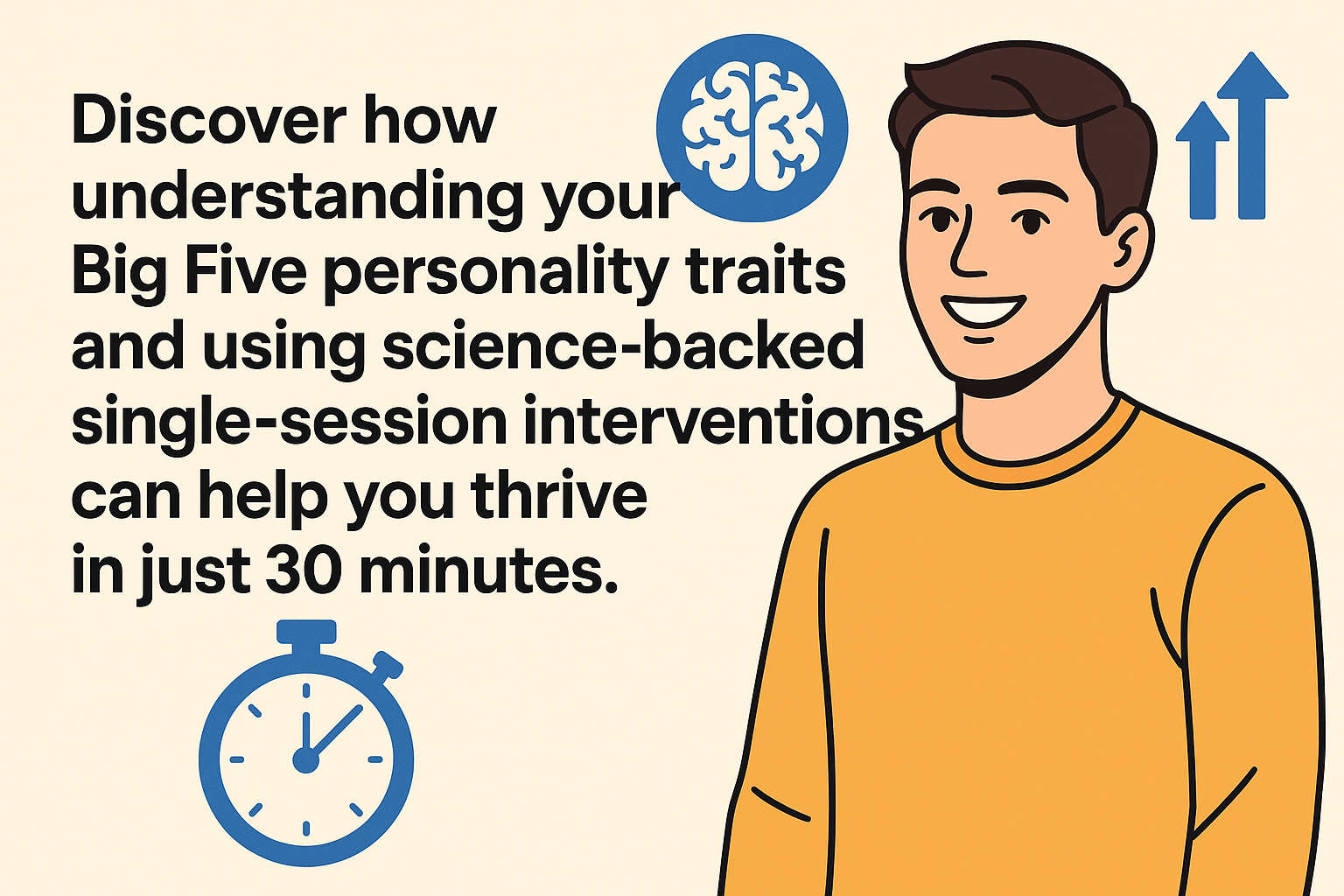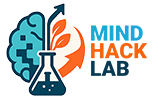Big Five Personality Traits

Your Personality Isn't Set in Stone
How Understanding Your Big Five Traits Can Transform Your Life in Just One Session
Picture this: You're at a dinner party, and someone mentions they just took a personality test. "I'm super high in neuroticism," they laugh nervously. "Guess that explains why I worry about everything!" The table chuckles knowingly, but here's what most people don't realize—those personality traits that feel like permanent fixtures? They're more like default settings that can be adjusted, and it often takes just one powerful conversation to start that change.
That's where the fascinating world of the Big Five personality traits meets the revolutionary approach of single-session interventions (SSIs). If you've ever wondered why you react to situations the way you do, or wished you could dial down your anxiety or amp up your social confidence, you're about to discover something game-changing.
Understanding Your Big Five Personality Blueprint
The Big Five personality model isn't just another internet quiz—it's the gold standard in personality psychology, backed by decades of research. These five core traits shape how we navigate the world:
🔹 Openness - Your appetite for new experiences and ideas
🔹 Conscientiousness - Your tendency toward organization and self-discipline
🔹 Extraversion - Your energy from social interactions
🔹 Agreeableness - Your cooperation and trust in others
🔹 Neuroticism - Your emotional reactivity and stress response
Think of these traits like the default apps on your mental smartphone. They're pre-installed, but that doesn't mean you can't update them or learn to use them more effectively. This is where Mind Hack Lab's Big Five Personality Quiz becomes your personal diagnostic tool, revealing not just who you are, but who you could become.
What Your Scores Really Mean (And Why They Matter)
Let me share a typical scenario: Someone discovers they score low in conscientiousness. "No wonder I can't stick to anything," they might sigh, ready to accept this as their life sentence. But here's the plot twist—research indicates that even brief, targeted interventions can help people develop new strategies that effectively compensate for their natural tendencies.
| Trait | Score | Meaning | SSI Solutions |
|---|---|---|---|
| Openness to Experience | High | Curious, imaginative, open |
|
| Openness to Experience | Low | Conventional, prefers routine |
|
| Conscientiousness | High | Organized, disciplined |
|
| Conscientiousness | Low | Spontaneous, less organized |
|
| Extraversion | High | Sociable, energetic |
|
| Extraversion | Low | Reserved, introspective |
|
| Agreeableness | High | Cooperative, empathetic |
|
| Agreeableness | Low | Competitive, skeptical |
|
| Neuroticism | High | Emotionally sensitive, anxious |
|
| Neuroticism | Low | Emotionally stable, calm |
|
The Single-Session Solution: Rapid Personality Optimization
Here's where things get exciting. Traditional therapy often assumes changing ingrained patterns takes months or years. But researchers like Dr. Jessica Schleider at Northwestern University (formerly at Stony Brook) have demonstrated that single-session interventions can create lasting change by teaching specific, powerful techniques in just 20-30 minutes.
Consider this composite example: A person with low conscientiousness learns a simple strategy in one focused session using behavioral activation techniques—pairing tasks they naturally enjoy with ones they typically avoid. By listening to their favorite podcast only while organizing their workspace, they hijack their brain's reward system. Research shows that participants who learn such techniques often continue using variations months later.
Studies suggest that SSIs work because they provide what Dr. Lisa Feldman Barrett calls "emotional granularity"—the ability to identify and work with subtle emotional differences. When you understand your personality traits with this level of precision, you can make targeted adjustments that stick.
Transform Your Traits: Practical Strategies You Can Start Today
Based on cognitive behavioral therapy (CBT) and acceptance and commitment therapy (ACT) principles, here are evidence-based approaches for each trait:
1️⃣ Balancing Openness
If you're too high: Create "focus containers"—designated times for exploration and times for execution. Set a timer for 25 minutes of focused work before allowing yourself to chase that interesting tangent.
If you're too low: Use the "yes, and" technique from improv comedy. Once a week, say yes to a small new experience and build on it. Start tiny—try a new coffee flavor or take a different route home.
2️⃣ Optimizing Conscientiousness
If you're too high: Practice "good enough" decisions. Set a time limit for tasks that don't require perfection. Remember: done is better than perfect for 80% of what you do.
If you're too low: Use "implementation intentions"—specific if-then plans. "If it's 7 PM, then I spend 10 minutes organizing tomorrow." The specificity bypasses the need for motivation.
3️⃣ Adjusting Extraversion
If you're too high: Build in "processing pauses." Before responding in conversations, count to three. This micro-moment helps you tune into others and your own deeper thoughts.
If you're too low: Use the "warm-up" strategy. Before social events, practice easy conversations with cashiers or neighbors. This primes your social muscles without overwhelming them.
The Mind Hack Lab Advantage
What makes Mind Hack Lab's approach different? It's the combination of scientific precision and practical application. Their SSIs don't try to change your fundamental personality—that's neither possible nor desirable. Instead, they teach you to work with your traits like a skilled chef works with ingredients, bringing out the best flavors while balancing what needs adjustment.
Research on single-session interventions indicates promising outcomes. Studies have shown effect sizes ranging from small to medium (d=0.18-0.33), which represent clinically meaningful improvements in:
🔹 Reduced symptoms of anxiety and depression
🔹 Improved coping strategies
🔹 Better emotional regulation
🔹 Increased self-efficacy and perceived control
While individual results vary, many participants report that learning specific strategies in a single session provides them with tools they continue to use months later. As one typical response might be: "I always thought being high in neuroticism meant I was broken. One session taught me to see my sensitivity as an early warning system I could calibrate, not eliminate."
Your Personality Evolution Starts Now
Here's the truth: You're not stuck with the personality you have today. While your core traits remain relatively stable, how you express and manage them is entirely within your control. Think of it like learning to drive a car—you don't need to rebuild the engine to become a better driver.
It's important to note that SSIs work best as part of a comprehensive approach to mental health. They can serve as powerful standalone interventions for specific challenges or as adjuncts to other forms of support. The key is finding what works for you.
✅ Key Takeaway: Your Big Five scores aren't your destiny—they're your starting point. With the right techniques, even a single focused session can teach you strategies that help you work more effectively with your natural tendencies.
📌 Ready to optimize your personality? Take the Big Five Personality Quiz to discover your unique trait profile. Then explore how Mind Hack Lab's single-session interventions can help you build on your strengths and develop strategies for areas where you want to grow—all in less time than it takes to watch your favorite TV show.
🔹 Imagine yourself next month: Still you, but with new tools to handle what used to trip you up. Research suggests that's a realistic possibility with single-session interventions.
Your personality is powerful, but how you work with it can evolve. The question isn't whether you can change—it's whether you're ready to learn new strategies to thrive with the personality you have. And with single-session interventions, that learning opportunity is just one session away.
What if you could feel better in just 20-30 minutes?
83% of people say single-session therapy gave them real relief from stress, anxiety, and overwhelm. No waiting lists. No weekly appointments. Just proven techniques that work immediately.
Most people discover it's the breakthrough they've been searching for.
→ Start your 20-30 minute session now
Because you don't have to wait to feel better.
